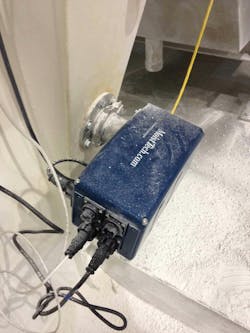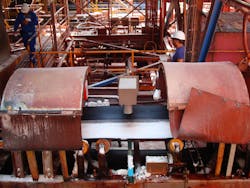The importance of moisture control in powder processing

Moisture control is a critical aspect of powder and bulk material processing. Whether in pharmaceuticals, food production, chemical manufacturing, or mining operations, precise moisture measurement ensures product quality, enhances safety, and optimizes production efficiency. Uncontrolled moisture levels can lead to excessive dust, equipment malfunctions, product degradation, and even hazardous conditions such as combustion risks. The ability to monitor and adjust moisture in real time helps manufacturers maintain uniformity, prevent waste, and improve overall process efficiency.
Moisture plays a crucial role in determining powder properties such as flowability, cohesive strength, and stability. Excessive moisture can cause clumping, blockages, and microbial growth, while insufficient moisture can lead to excessive dust, poor binding, and product inconsistencies. Controlling moisture levels throughout production ensures that powders meet industry specifications and perform as expected in their final applications.
Moisture content also affects transportation costs and environmental impact. Products with higher moisture levels weigh more, increasing transportation expenses. Additionally, moisture control reduces energy consumption by optimizing drying processes, leading to lower operational costs and more sustainable manufacturing practices. When moisture is not properly controlled, equipment wear is accelerated, leading to increased maintenance costs and potential downtime.
Challenges in maintaining consistent moisture levels
Manufacturers face several challenges in maintaining consistent moisture levels during powder production. Traditional moisture measurement methods, such as manual sampling and laboratory testing, are prone to inaccuracies and testing delays. Manual methods also require significant labor and time, leading to inefficiencies.
One of the primary challenges in moisture measurement is the variability in environmental conditions such as temperature, humidity, and airflow. As powders move through different stages of processing, their moisture content can fluctuate due to these external factors, affecting their flowability and behavior in storage and transport. If moisture levels are too high, powders may clump together, causing blockages in machinery that disrupt production. On the other hand, if moisture is too low, fine powders can become airborne, increasing dust-related safety risks and product loss.
Another major issue is the reliability of moisture measurement tools. Some older measurement technologies require frequent recalibration and maintenance, leading to production inefficiencies and unexpected downtime. Additionally, many moisture measurement systems are unable to provide real-time feedback, making it difficult for manufacturers to make immediate process adjustments. Without continuous monitoring, deviations in moisture content may not be detected until final quality control checks, at which point substantial amounts of material may have already been wasted.
Implementing a reliable and automated moisture control system is essential for mitigating these challenges. By incorporating real-time monitoring, manufacturers can detect and correct moisture fluctuations immediately, ensuring that powders remain within optimal specifications. Advanced moisture sensors are designed to integrate seamlessly with existing process control systems, allowing for closed-loop control and minimal manual intervention.
Real-time moisture monitoring
Advancements in moisture measurement technology, particularly near-infrared (NIR) spectroscopy, have transformed moisture control in powder processing. Unlike traditional methods that require direct contact with materials, NIR sensors provide accurate, non-contact moisture readings in real time. These sensors enable manufacturers to integrate moisture monitoring into automated production systems, ensuring precise adjustments without manual intervention.
Real-time moisture monitoring offers significant benefits. By continuously analyzing moisture content during processing, manufacturers can prevent product loss and unnecessary energy expenditure. The ability to detect and adjust moisture fluctuations on the spot ensures consistent product quality while reducing waste. Additionally, real-time monitoring enhances workplace safety by preventing excessive dust formation, which can lead to combustion risks and air quality concerns.
Preventing product degradation with moisture sensing technology
Moisture control is essential for preventing product degradation in bulk material processing. Powders with unstable moisture levels are prone to caking, separation, and microbial contamination, all of which impact product performance and shelf life. By implementing inline moisture sensors, manufacturers can continuously monitor and adjust moisture levels to maintain product stability.
Automated moisture monitoring systems integrate seamlessly with process control systems, allowing real-time adjustments to drying, blending, and storage conditions. This closed-loop control approach minimizes quality deviations, enhances consistency, and reduces reliance on corrective actions that slow down production. By eliminating guesswork and human error, moisture sensors improve production efficiency and ensure that only high-quality, uniform products reach consumers.
Precise moisture control is crucial across various industries. In pharmaceuticals, maintaining specific moisture levels ensures uniformity in tablet formulations and prevents issues such as caking and reduced efficacy. In food processing, moisture control helps maintain ingredient consistency, prevent microbial growth, and improve shelf stability. The chemical industry benefits from optimized reactions and reduced dust-related safety hazards, while mining and mineral processing operations rely on moisture measurement to reduce dust emissions and improve material handling. In plastics and textiles, moisture control prevents defects in final products and enhances overall production efficiency.
Selecting the right moisture measurement system
Choosing the right moisture measurement system is critical for achieving optimal process control. Manufacturers must consider factors such as accuracy, response time, ease of integration, and system durability when selecting a moisture sensor. Modern moisture sensors should offer real-time, inline measurements to eliminate the need for manual sampling, ensuring continuous monitoring throughout the production process. They should also provide high accuracy and repeatability to maintain consistent product quality, as well as seamless integration with existing process control systems for automated adjustments. Additionally, selecting a system with low maintenance requirements can help minimize operational disruptions and reduce long-term costs.
In the evolving landscape of powder and bulk material processing, real-time moisture measurement has become a necessity rather than a luxury, so it is critical to work with a moisture sensor supplier that can provide cutting-edge, reliable technology. For example, MoistTech’s non-contact NIR moisture sensors require only a one-time calibration, eliminating the need for frequent recalibrations or costly service calls. This advanced technology ensures that moisture measurement remains accurate without drift over time. Additionally, MoistTech’s systems are designed for easy integration into existing production lines, allowing manufacturers to implement closed-loop moisture control without overhauling their processes.
Such moisture sensing technologies, which prioritize efficiency, safety, and reliability, empower manufacturers to optimize their production operations, reduce waste, and enhance profitability, ensuring that industries worldwide can achieve superior results with confidence.
MoistTech Corp.
About the Author
Sarah Hammond
Sarah Hammond is marketing manager for MoistTech, a provider of moisture measurement and control sensors for use both on the production line and in the laboratory in a range of industries, including foods, animal foods, chemicals, minerals, paper, textiles, and renewable energy.
